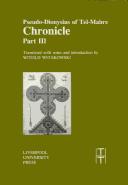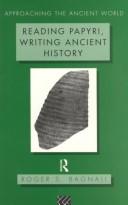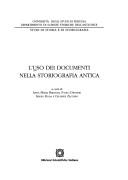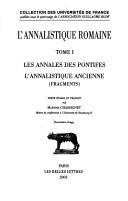| Listing 1 - 10 of 17 | << page >> |
Sort by
|

ISBN: 0853237603 9780853237600 Year: 1996 Volume: 22 Publisher: Liverpool Liverpool university press
Abstract | Keywords | Export | Availability | Bookmark
 Loading...
Loading...Choose an application
- Reference Manager
- EndNote
- RefWorks (Direct export to RefWorks)
Syria --- Syrie --- History --- Histoire --- History, Ancient --- History, Ancient - Sources
Book
ISBN: 9781905670567 1905670567 Year: 2015 Volume: 129 Publisher: London University of London. Institute of classical studies
Abstract | Keywords | Export | Availability | Bookmark
 Loading...
Loading...Choose an application
- Reference Manager
- EndNote
- RefWorks (Direct export to RefWorks)
History, Ancient --- Handley, E. W. --- History, Ancient - Sources

ISBN: 2701116511 9782701116518 Year: 1995 Publisher: Paris : Belin,
Abstract | Keywords | Export | Availability | Bookmark
 Loading...
Loading...Choose an application
- Reference Manager
- EndNote
- RefWorks (Direct export to RefWorks)
Historians --- History, Ancient --- Historiens --- Histoire ancienne --- Historiography --- Sources --- Historiographie --- Biography. --- Historians - Biography --- History, Ancient - Sources

ISBN: 9780888442864 0888442866 Year: 1999 Volume: 36 Publisher: Toronto : Pontifical Institute of Mediaeval Studies,
Abstract | Keywords | Export | Availability | Bookmark
 Loading...
Loading...Choose an application
- Reference Manager
- EndNote
- RefWorks (Direct export to RefWorks)
History, Ancient --- Histoire ancienne --- Sources --- Dionysius --- Syria --- Syrie --- History --- Histoire --- Makhtevanuta --- Pseudo-Dionysius, --- History, Ancient - Sources --- Pseudo-Dionysius, - of Tel-Maḥrē, - active 8th century. - Makhtevanuta

ISBN: 0415093767 0415093775 9780415093774 Year: 1995 Publisher: London : Routledge,
Abstract | Keywords | Export | Availability | Bookmark
 Loading...
Loading...Choose an application
- Reference Manager
- EndNote
- RefWorks (Direct export to RefWorks)
History, Ancient --- Manuscripts (Papyri). --- Paleography. --- Historiography. --- Sources. --- Manuscripts (Papyri) --- Histoire ancienne --- Papyrus (Manuscrits) --- Historiography --- Sources --- Historiographie --- Handschriften (Papyri) --- Manuscrits (Papyrus) --- Papyri [Egyptian ] --- Paleography --- Handwriting --- Auxiliary sciences of history --- Writing --- Diplomatics --- Illumination of books and manuscripts --- Manuscripts --- Papyri, Egyptian --- Papyrus manuscripts --- Writing materials and instruments --- History [Ancient ] --- History, Ancient - Sources. --- History, Ancient - Historiography. --- History, Ancient - Sources
Book
ISBN: 9780674428355 0674428358 Year: 2014 Volume: 65 Publisher: Washington Center for Hellenic studies
Abstract | Keywords | Export | Availability | Bookmark
 Loading...
Loading...Choose an application
- Reference Manager
- EndNote
- RefWorks (Direct export to RefWorks)
Christians talked, debated, and wrote dialogues in late antiquity and on throughout Byzantium. Some were philosophical, others more literary, theological, or Platonic; Aristotle also came into the picture as time went on. Sometimes the written works claim to be records of actual public debates, and we know that many such debates did take place and continued to do so. Dialoguing in Late Antiquity takes up a challenge laid down by recent scholars who argue that a wall of silence came down in the fifth century AD, after which Christians did not "dialogue."Averil Cameron now returns to questions raised in her book Christianity and the Rhetoric of Empire (1991), drawing on the large repertoire of surviving Christian dialogue texts from late antiquity to make a forceful case for their centrality in Greek literature from the second century and the Second Sophistic onward. At the same time, Dialoguing in Late Antiquity points forward to the long and neglected history of dialogue in Byzantium. Throughout this study, Cameron engages with current literary approaches and is a powerful advocate for the greater integration of Christian texts by literary scholars and historians alike.
History, Ancient --- Historiography. --- Sources. --- Rome --- Byzantine Empire --- History --- Dialogue. --- Debates and debating --- Christian philosophy --- History. --- Historiography --- History, Ancient - Historiography. --- History, Ancient - Sources --- Rome - History - Empire, 284-476 - Historiography. --- Byzantine Empire - History - To 527 - Historiography.

ISBN: 8849507763 9788849507768 Year: 2003 Volume: XII Publisher: Napoli : Edizioni scientifiche italiane,
Abstract | Keywords | Export | Availability | Bookmark
 Loading...
Loading...Choose an application
- Reference Manager
- EndNote
- RefWorks (Direct export to RefWorks)
History, Ancient --- Historiography --- Histoire ancienne --- Historiographie --- Congresses. --- Sources --- Congrès --- Congrès --- Historical criticism --- History --- Authorship --- Ancient history --- Ancient world history --- World history --- Criticism --- History, Ancient - Historiography - Congresses --- History, Ancient - Sources - Congresses --- Historiography - Greece - Sources - Congresses --- Historiography - Rome - Sources - Congresses --- Historiography - Sources - Congresses --- Historiographie ancienne --- Diplomatique --- Histoire --- Méthodologie --- Antiquité
Book
ISBN: 9781463206635 1463206631 Year: 2017 Volume: 2 Publisher: Piscataway, NJ Gorgias Press LLC
Abstract | Keywords | Export | Availability | Bookmark
 Loading...
Loading...Choose an application
- Reference Manager
- EndNote
- RefWorks (Direct export to RefWorks)
The Chronicle of Zuqnin is a universal history beginning with the Creation according to the biblical account and ending with the time of the Chronicler, the years 775-776 AD. The author is most probably Joshua the Stylite, a contemporary of the Caliphs al-Mansur and al-Mahdi, who lived in the monastery of Zuqnin that was located near Amid, the Diar-Bakr of modern Turkey. Parts I and II contain compiled sources some of which survived only in this Chronicle. Sources include the Bible, Cave of Treasures, the Sleepers of Ephesus, Eusebius of Caesarea, Socrates, and the short Chronicle called Pseudo-Joshua the Stylite that deals with Sassanian-Byzantine warfare at the begging of the 6th century. Parts III and IV cover the years 488 and 775 AD. In this volume, Parts I and II, including the author?s dedicatory letter, are now published in an updated edition of the Syriac text and the first English translation.
History, Ancient --- Syriac language --- Texts. --- Pseudo-Dionysius, --- Middle East --- Byzantine Empire --- History --- Church history --- History, Ancient. --- 276 =923 --- 276 =923 Patrologie syrienne --- 276 =923 Syrische patrologie --- Patrologie syrienne --- Syrische patrologie --- History, Ancient - Sources. --- Syriac language - Texts. --- Pseudo-Dionysius, - of Tel-Maḥrē, - active 8th century. - Makhtevanuta --- Middle East - History - To 622 - Sources. --- Byzantine Empire - History - 527-1081 - Sources. --- Middle East - Church history - Sources.

ISSN: 01847155 ISBN: 225101392X 2251014187 2251014357 9782251013923 9782251014357 Year: 1996 Volume: 331, 357, 375 Publisher: Paris Belles Lettres
Abstract | Keywords | Export | Availability | Bookmark
 Loading...
Loading...Choose an application
- Reference Manager
- EndNote
- RefWorks (Direct export to RefWorks)
Classical Latin literature --- Classical Greek literature --- Roman history --- Rome --- History --- Sources --- Histoire --- 871 <08> --- 870 --- 870.9001 --- 871 <08> Latijnse literatuur--Verzamelwerken. Reeksen --- Latijnse literatuur--Verzamelwerken. Reeksen --- Literature Latin --- Literature Latin ( - 500) --- History, Ancient --- Historiography --- Rome - History - Sources --- History, Ancient - Sources --- Historiography - Rome - History
Book
ISBN: 9783406026966 3406026966 Year: 2020 Publisher: München Beck
Abstract | Keywords | Export | Availability | Bookmark
 Loading...
Loading...Choose an application
- Reference Manager
- EndNote
- RefWorks (Direct export to RefWorks)
Arbitrage (droit grec) --- Inscriptions grecques. --- Inscriptions latines. --- Villes antiques. --- Grèce --- Rome --- Politique et gouvernement --- Treaties. --- History, Ancient --- Sources. --- Law, Ancient --- History, Ancient - Sources --- Inscriptions, Greek --- Diplomacy --- Treaties --- Inscriptions grecques --- Traités --- Histoire ancienne --- History --- To 1500. --- Sources --- Greece --- Grèce --- Foreign relations
| Listing 1 - 10 of 17 | << page >> |
Sort by
|

 Search
Search Feedback
Feedback About UniCat
About UniCat  Help
Help News
News